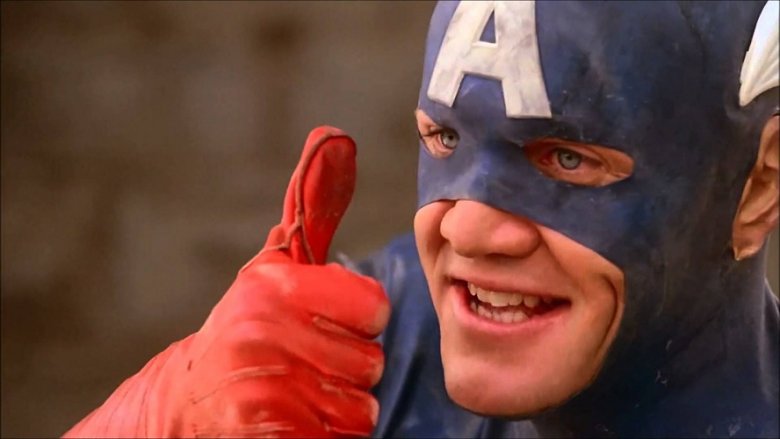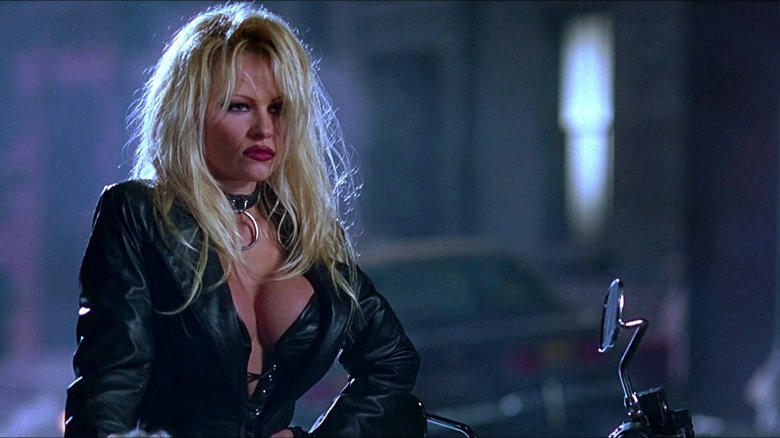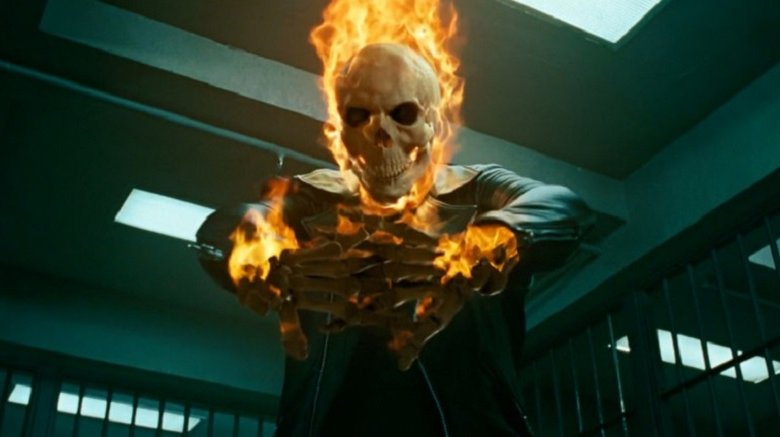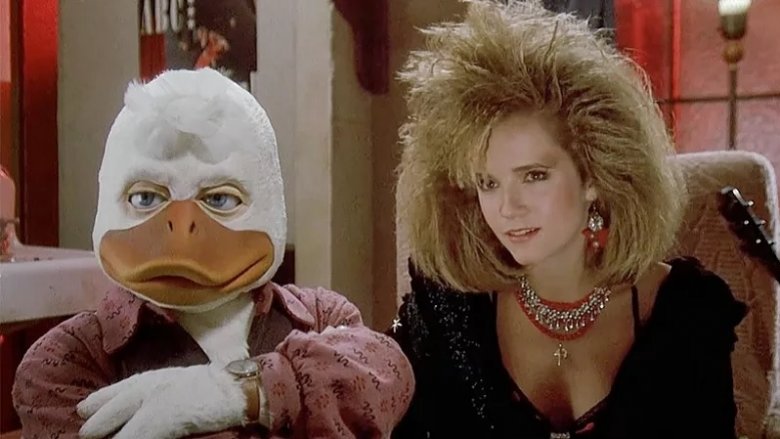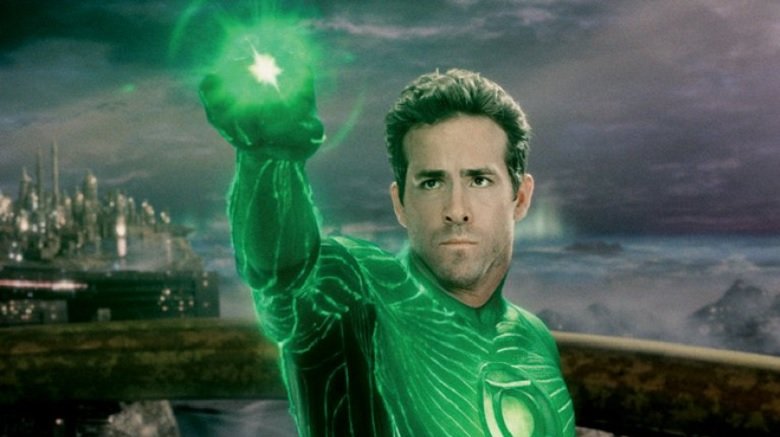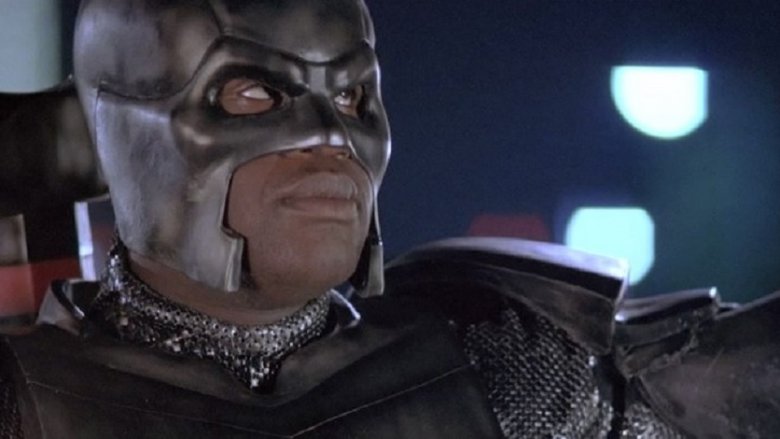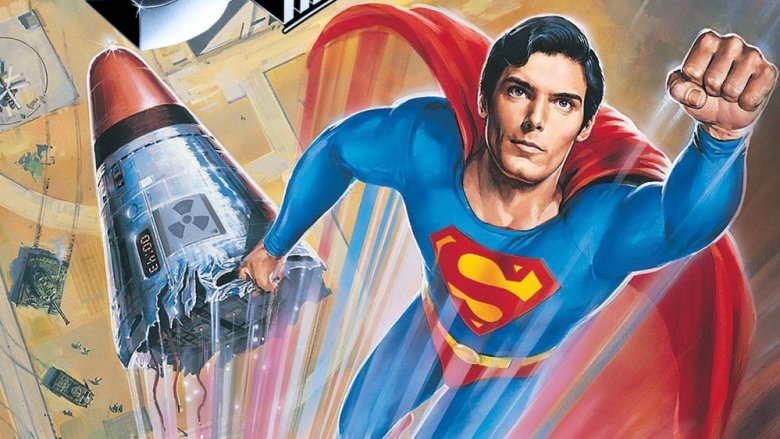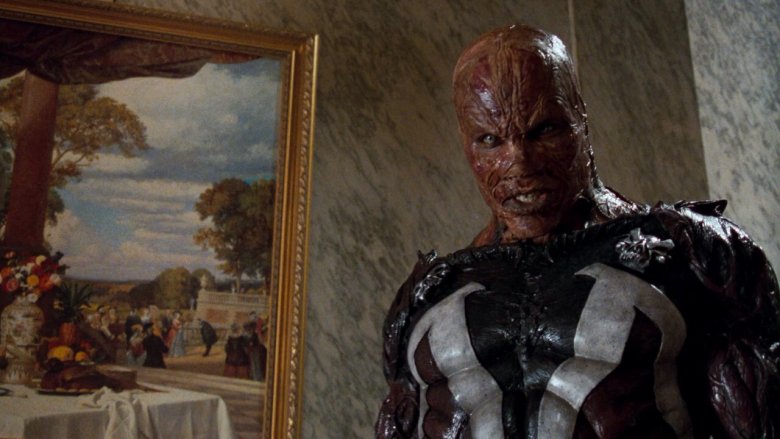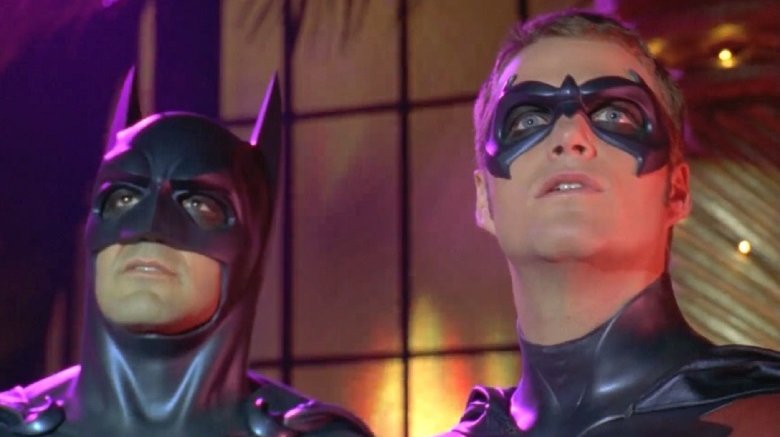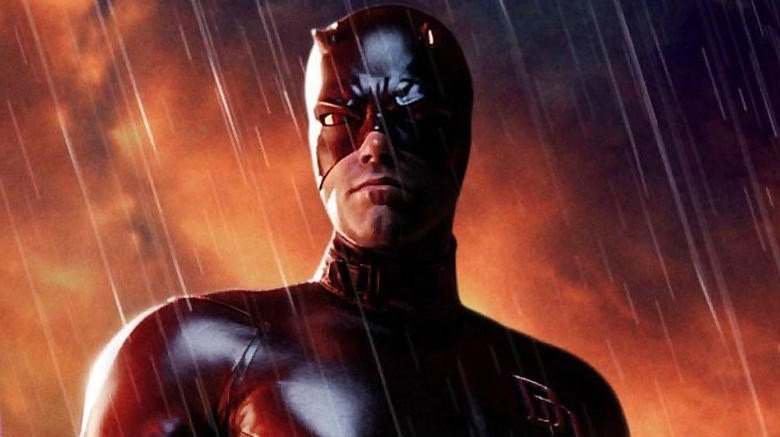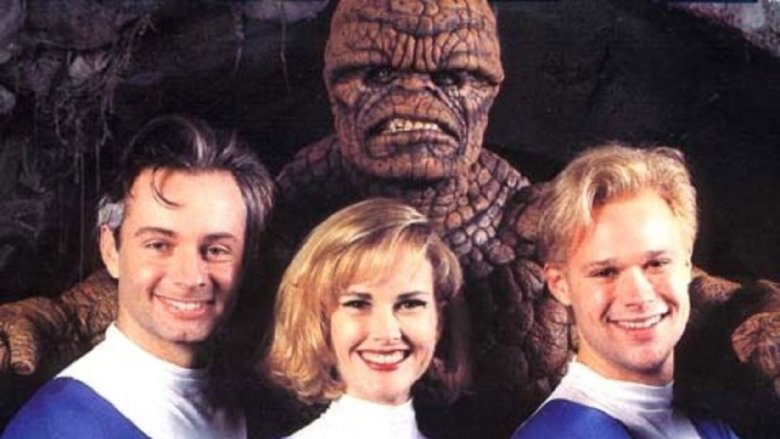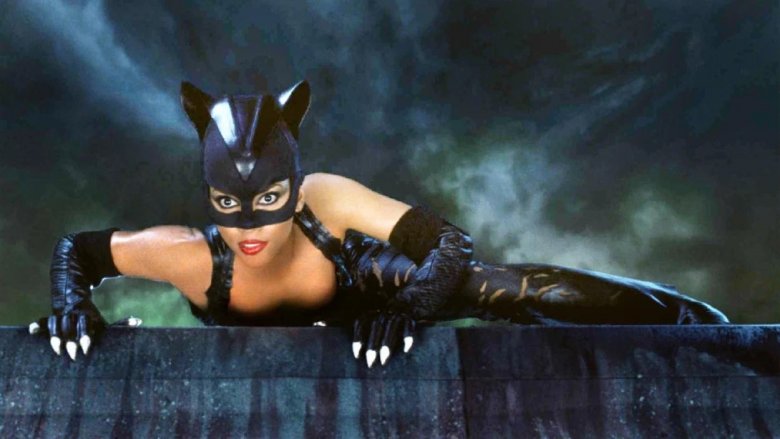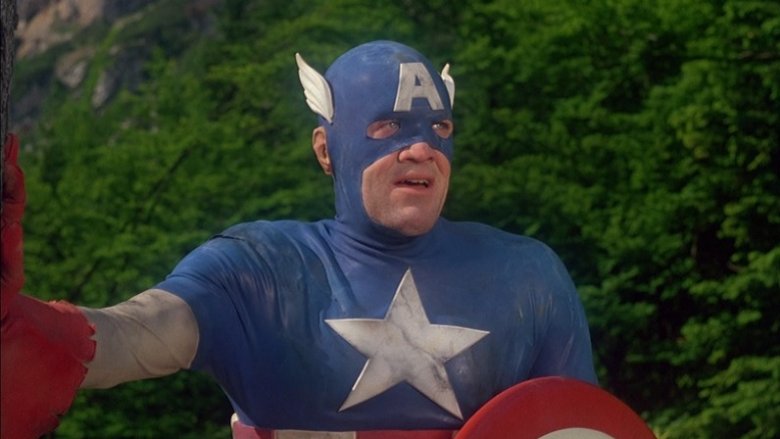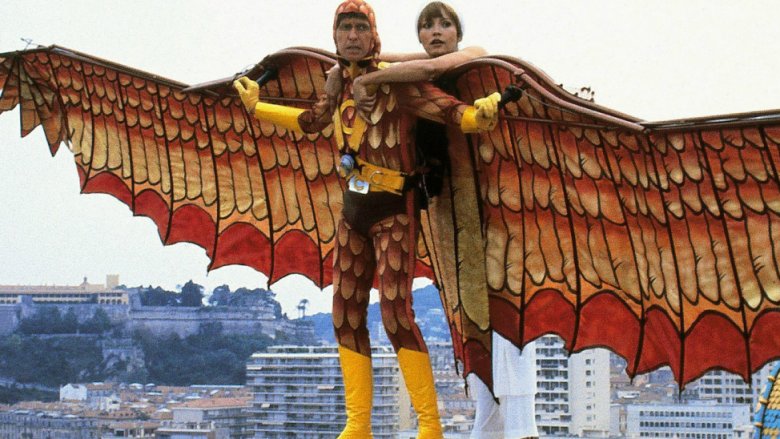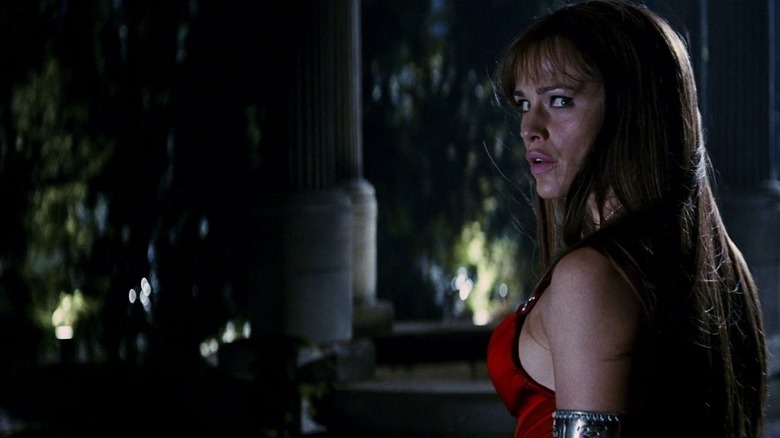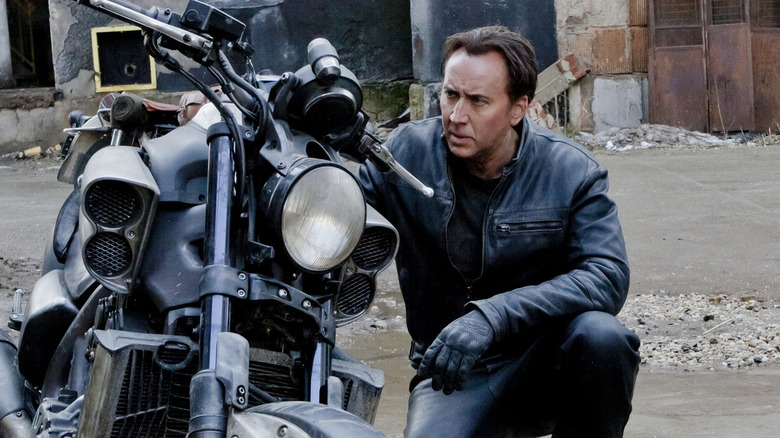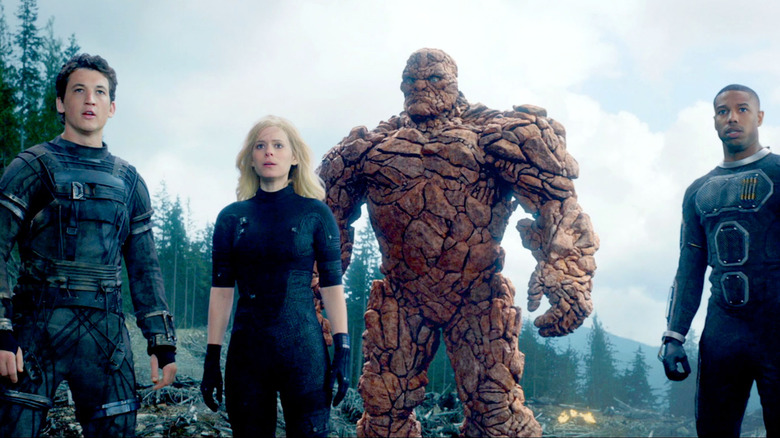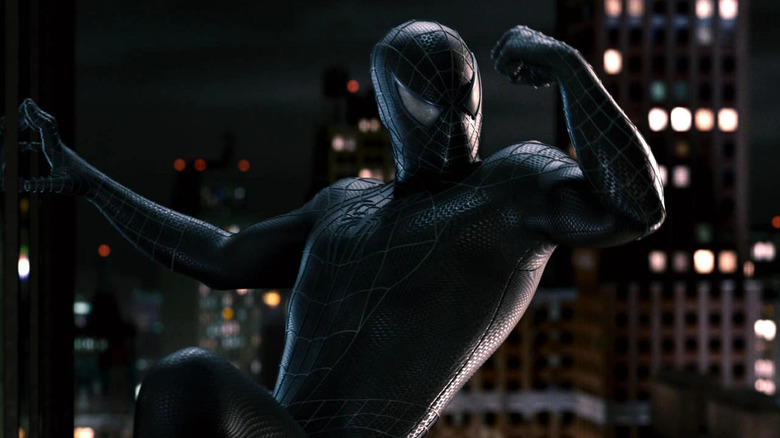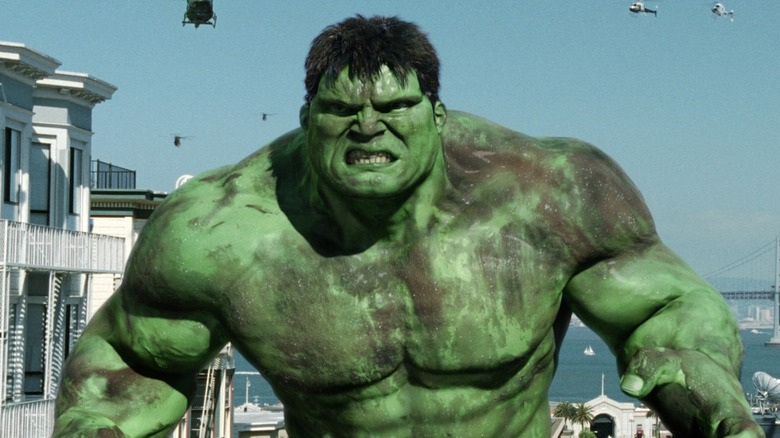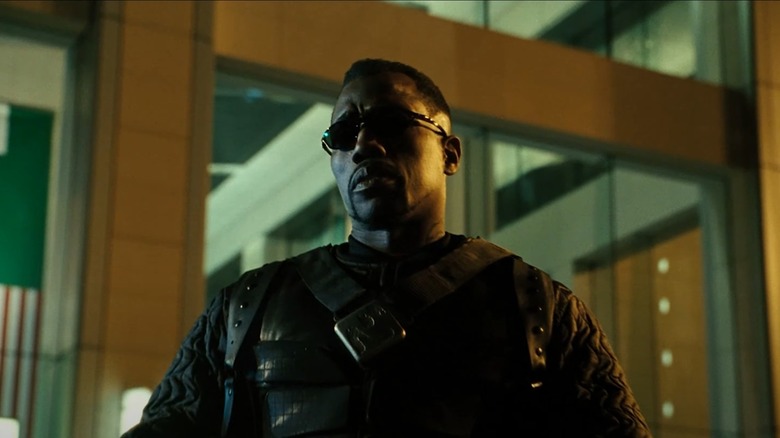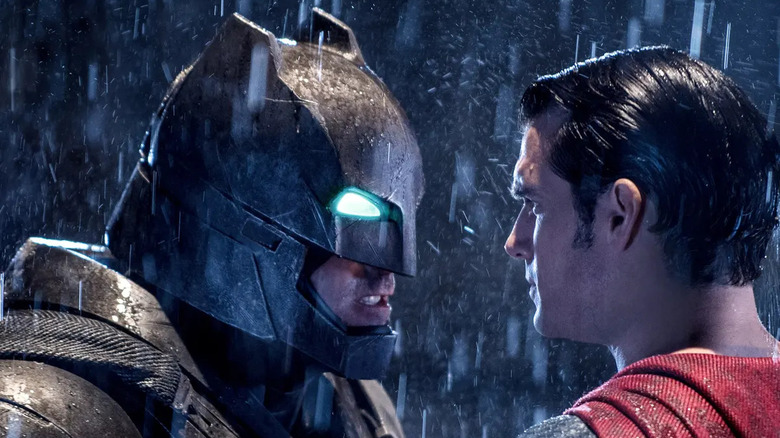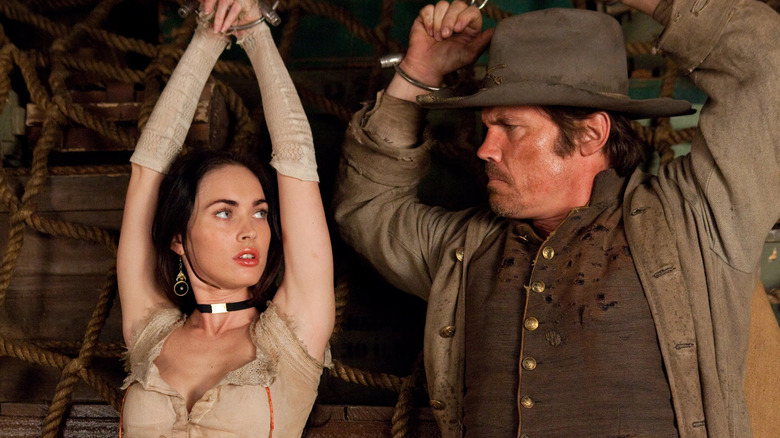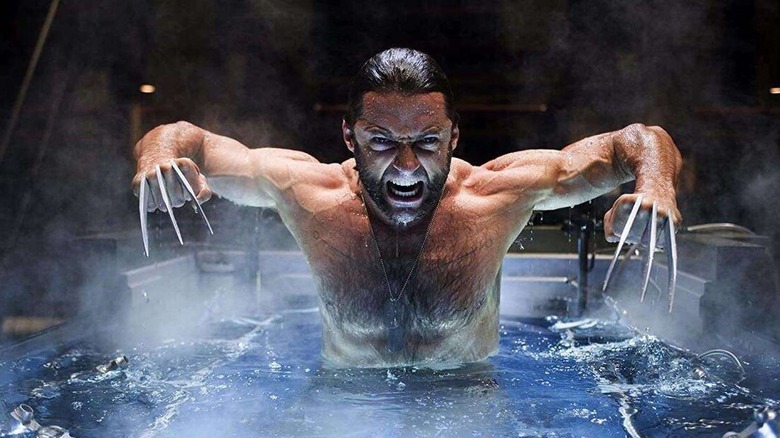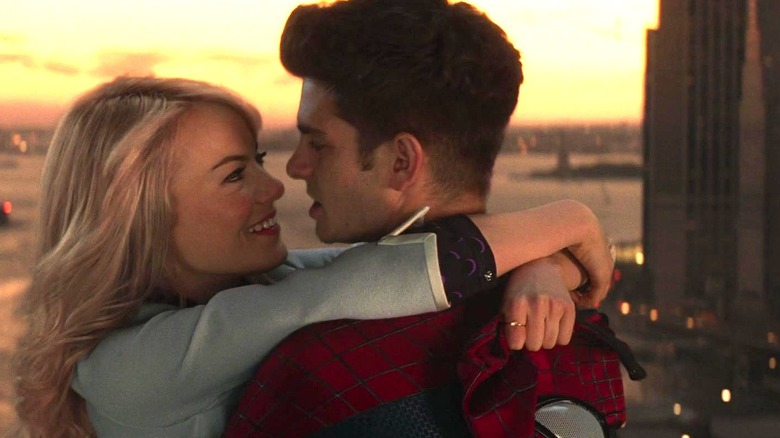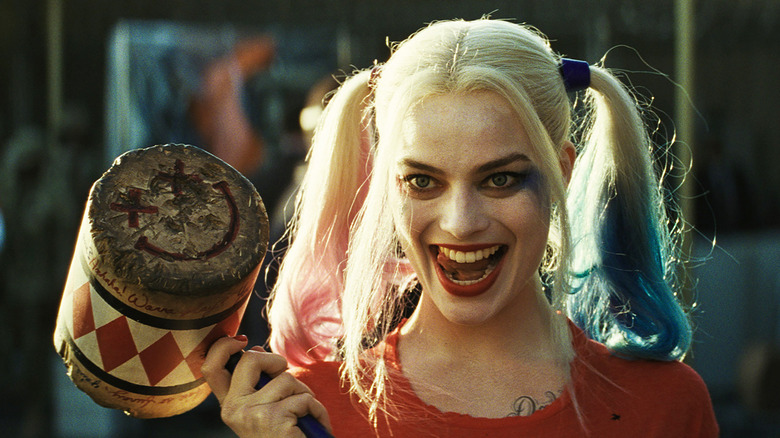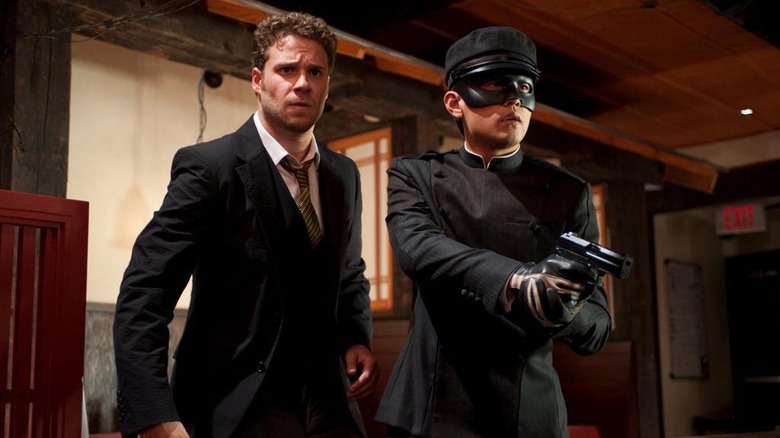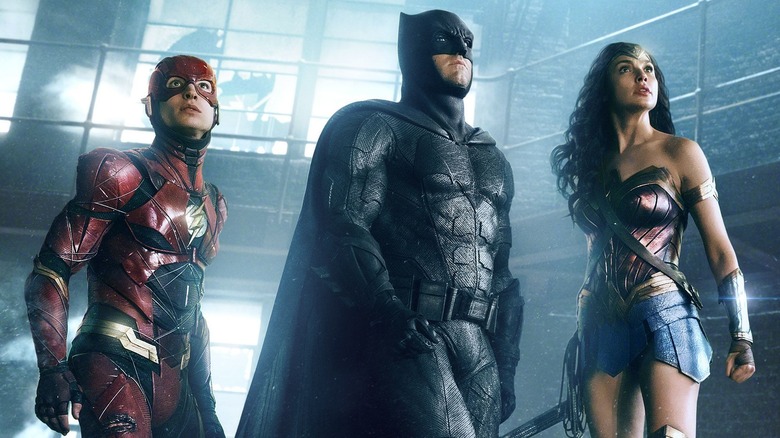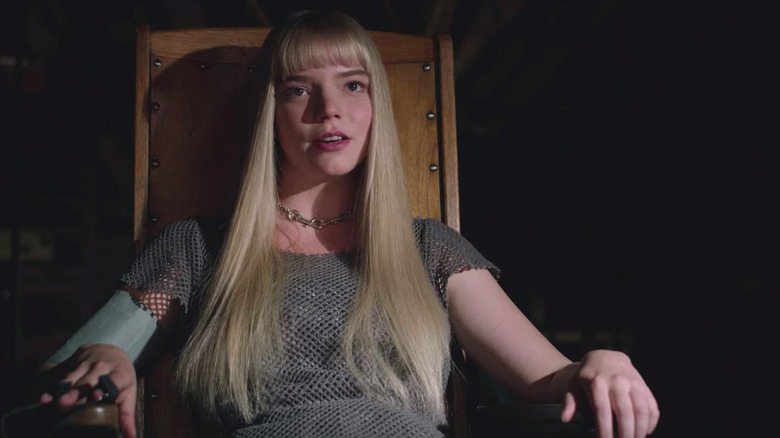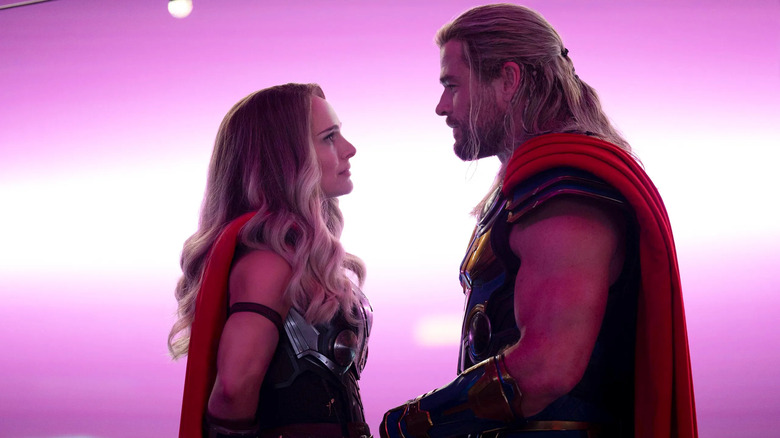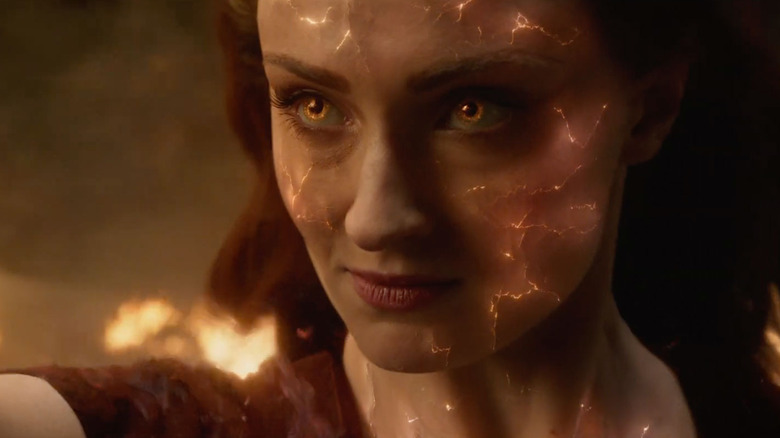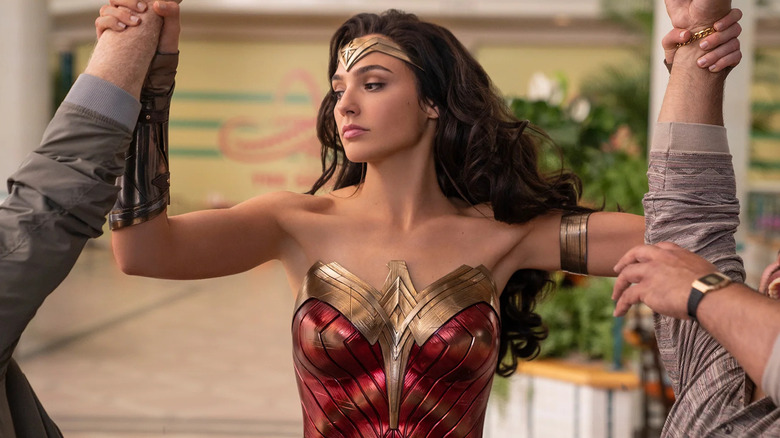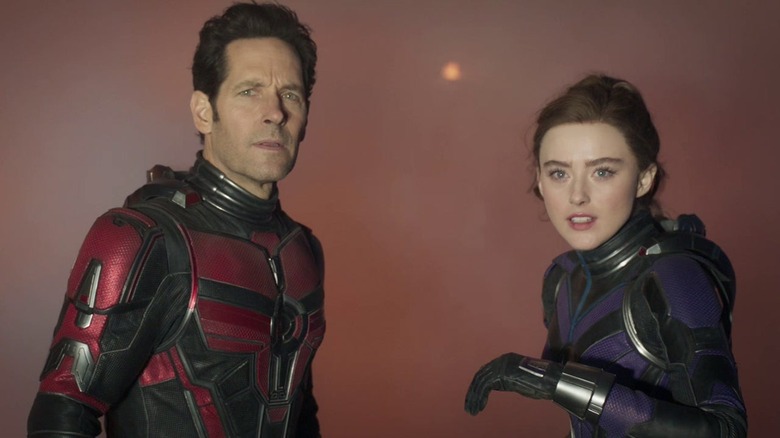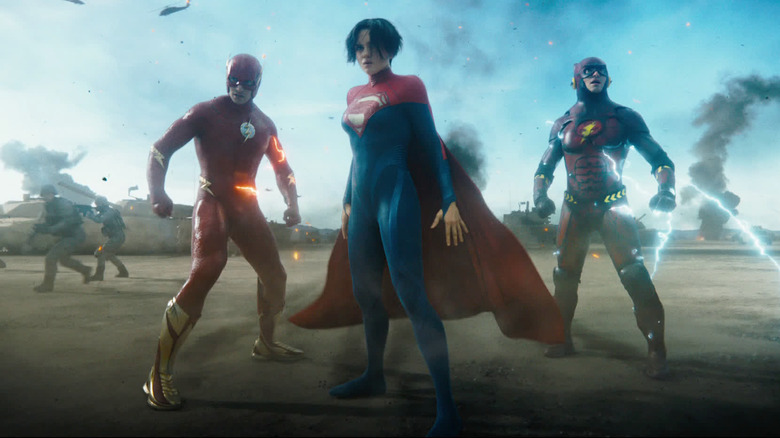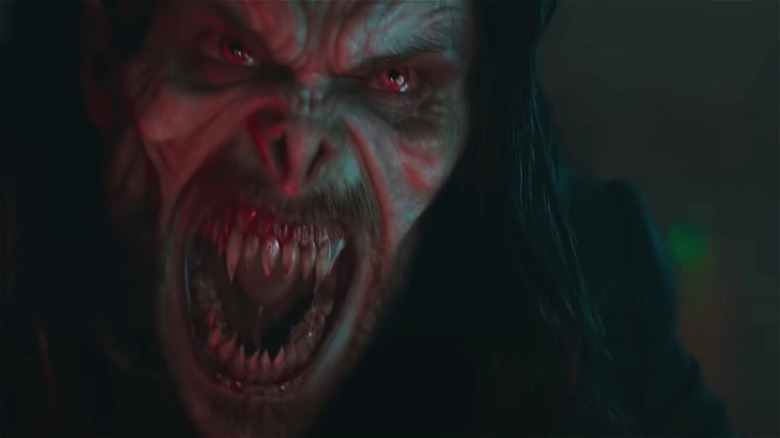The Worst Superhero Movies Ever Made
They might be the biggest earners in the franchise-driven Hollywood of today, but the history of the superhero movie is checkered to say the least. It took a lot of trial and error to get to the point where studios were willing to sign off on nine-figure budgets — something that would have been considered absolute folly prior to the late 1970s, when Richard Donner emphatically proved that superhero movies could work if filmmakers were properly backed (his Superman cost a cool $55 million to make), paving the way for the Marvel Cinematic Universe in the bargain. The period between Donner's Superman and the first MCU movie wasn't an altogether fruitful one, however. Some truly terrible superhero films came out during this time — and some real stinkers have come out in the MCU era, too. Let's find out what went wrong with the worst superhero movies ever made.
Barb Wire (1996)
The leather costume that Pamela Anderson squeezed into for the 1996 adaptation of Dark Horse Comics' Barb Wire was deemed "unnecessarily revealing" by The Telegraph, though for fans of the buxom blonde pin-up, this was the only highlight. The plot revolves around bartender and bounty hunter Barb (Anderson) attempting to escape the devastation of the so-called Second American Civil War of 2017. The leading lady's acting was heavily criticized in reviews, with her inability to deliver believable lines and lack of comedic timing proving a major sticking point for critics. According to the Baywatch star, what should have been a campy classic was ruined by the interference of the movie's backers, Polygram.
"It wasn't supposed to turn out like it did," she told Interview. "When I saw the comic book the movie's based on, I thought, 'Oh my God, she's on a motorcycle in leather, crazy, with big hair, glamorous. This is hysterical. It's totally me.'" Anderson signed on for what she thought was going to be "a dark comedy, real cartoony," but execs changed direction just before production kicked off. "More action, less humor, a different director," Anderson said. "They changed the script six million times."
Ghost Rider (2007)
Watching Ghost Rider today, it's astonishing to think that this Nicolas Cage-led Marvel movie came out just one year before the Marvel Cinematic Universe kicked off with 2008's Iron Man. Not only did Cage ham it up like only he can, but the CGI used to turn the eccentric actor into Johnny Blaze didn't even look that convincing back then, never mind holding up today. According to Cage, the real problem with Ghost Rider (and its equally bad 2012 sequel Spirit of Vengeance) wasn't his acting or the schlocky visual effects, it was the PG-13 rating.
Speaking to JoBlo, Cage revealed that he wanted to go with an edgy, R-rated script turned in by David S. Goyer, but Sony were apparently too afraid to go there at the time. "Ghost Rider was a movie that always should've been an R-rated movie," Cage argued. "David Goyer had a brilliant script which I wanted to do with David, and for whatever reason they just didn't let us make the movie." Cage went on to make the case for rebooting Ghost Rider with a new target audience in mind. "Heck, Deadpool was R-rated and that did great. Ghost Rider was designed to be a scary superhero with an R rating and edge, and they just didn't have it worked out back then."
Howard the Duck (1986)
Interest in one of Marvel's stranger characters, Howard the Duck, spiked after the anthropomorphic bird popped up in a Guardians of the Galaxy post-credit scene, but those who decided to check out his standalone '80s outing after seeing this were more than likely highly disappointed. Howard the Duck was produced by George Lucas and starred Lea Thompson, who was still riding the Back to the Future wave at the time. Thompson had high hopes for the project, but over the course of the frustrating shoot, she realized it wasn't going to live up to the hype.
"They got all obsessed about having you see the words coming out of the lips of the duck," Thompson told Yahoo!. "Like anyone was going to believe it was real!" After Robin Williams declined, the job of voicing Howard fell to theater actor Chip Zien, who knew something was wrong when Universal neglected to throw a premiere party. "The day the movie opened was the first time I had seen it," Zien revealed. "I paid for my ticket. I went in and was horrified because it was relatively empty. There was no line. By the end of the movie, I was all alone with my friend Roy in the theater. It was just the two of us sitting there."
Green Lantern (2011)
The failure of 2011's Green Lantern risked ruining the career of leading man Ryan Reynolds, and he nearly took the whole superhero genre with him. The scathing reviews and terrible numbers (it reportedly cost a whopping $300 million to make, $80 million more than its worldwide box office total) threatened to turn studios off the idea of comic book movies altogether, but Reynolds had a way to make right. The very same weekend Green Lantern opened, the Canadian filmed the now-famous Deadpool test footage that would leak three years later and convince Fox to give him his shot at redemption.
Reynolds took the chance with both hands, and his many years of lobbying paid off when Deadpool became a huge hit. The resurgent star credited the success of the R-rated smash to the fact that he and everyone involved had a clear vision right from the get-go. "With Green Lantern, I don't think anyone ever figured out exactly what it was," he told CinemaBlend. "It also fell victim to the process in Hollywood which is like poster first, release date second, script last. At the time, it was a huge opportunity for me, so I was excited to try and take part in it."
Steel (1997)
Marvel's Black Panther was quite rightly lauded for bringing together a cast that was 90 percent African or African-American, but King T'Challa wasn't the first black superhero to make it to the big screen. People often overlook the fact that Shaquille O'Neal beat Chadwick Boseman to the punch when he starred in the 1997 adaptation of DC's Steel, though nobody can really be blamed for forgetting about this downright awful movie. Twenty years after its abysmal release (it pulled in $1.7 million against a budget of $16 million), Steel director Kenneth Johnson apologized for his creation, admitting that he probably should have walked away once he found out who his star was going to be.
"I said, 'Guys, if you're gonna put Shaq in the lead, then you've got to at least have a major movie star next to them," he told Vice. "Yes, he was a big persona and a great role model for kids and all that, but he's no movie star. But these people just wouldn't budge a dime to place an actual movie star in the role." Johnson went on to reveal that Warner Bros. co-president Bill Gerber (who was fired the following year) opted for O'Neal over the likes of Wesley Snipes and Denzel Washington because he knew Shaq would "sell more toys."
Superman IV: The Quest For Peace (1987)
Marvel Studios president Kevin Feige once called Richard Donner's Superman the "paradigm by which we all still should follow" when it comes to making superhero movies. This critically acclaimed adaptation of DC's most famous comic book was a genre benchmark, but when audiences started to tire of the franchise two sequels later, the rights were sold off to cousins Menahem Golan and Yoram Globus, founders of the Cannon Group. The pair had developed a reputation as some of the most disreputable figures in the film industry, and Christopher Reeve saw this side of them during the making of the universally abhorred Superman IV: The Quest For Peace.
In his biography Still Me, Reeve revealed that the production was plagued by cutbacks and tight budget restraints. To save money, shooting was moved to England, which hurt the integrity of the final product. "[There's] a scene in which Superman lands on 42nd Street and walks down the double yellow lines to the United Nations, where he gives a speech," Reeve wrote (via Flickering Myth). "If that had been a scene in Superman, we would actually have shot it on 42nd Street... Instead, we had to shoot at an industrial park in England in the rain with about a hundred extras, not a car in sight, and a dozen pigeons thrown in for atmosphere."
Spawn (1997)
When you sit down to watch a DVD commentary and the first thing the director says is "you can blame it all on me," it doesn't bode well. That's exactly how Mark Dippè introduces himself in the Spawn commentary. A former Industrial Lights and Magic employee, Dippè was known as a visual effects wizard at the time, but he'd never directed a movie before — and it showed. Badly. "Spawn is a staggeringly poor film," Den of Geek said when they revisited the botched adaptation in 2015. "[It's] an effects movie, but a good number of the effects aren't good. Some are flat out awful."
As a former ILM staffer, the one thing that Dippè ought to have been able to get right was the visual effects, though as far as he was concerned, the CGI wasn't the problem. Speaking to Wired in 1997, the outspoken filmmaker lashed out at censors for forcing him to change parts of the movie he felt were perfectly suitable for PG-13 audiences. "The MPAA is driving a stake through my heart with this, because they're making me take this movie down so much," he said. "They're a bunch of buttheads. They should stand up for something like this because deep down, Spawn is a very positive story."
Batman and Robin (1997)
The most infamous of the multiple terrible superhero movies to drop in 1997, Batman and Robin put an end to the Caped Crusader in Hollywood until Christopher Nolan came along and resurrected the franchise with his Dark Knight trilogy. Warner Bros. brought Joel Schumacher on board to replace Tim Burton for 1995's Batman Forever, which made tons of merchandise money but didn't go over so well with critics. Follow-up Batman and Robin also made money, but this time out, the critics (and the fans) were up in arms. The movie has a measly 10 percent rating on Rotten Tomatoes today, and Schumacher is well aware that he'll never live it down.
"After Batman and Robin, I was scum. It was like I had murdered a baby," he told Vice. "Look, I apologize. I want to apologize to every fan that was disappointed, because I think I owe them that." Chris O'Donnell (who played Robin to George Clooney's Batman) blamed the studio for not having its priorities straight. "On Batman Forever, I felt like I was making a movie," he said. "The second time, I felt like I was making a kid's toy."
Daredevil (2003)
Long before he donned the Dark Knight's cape and cowl in the DC Extended Universe, Ben Affleck made his ill-fated foray into the superhero genre with 2003's Daredevil. The blind vigilante is a favorite among Marvel fans, who by and large hated Affleck's take. The critics weren't convinced, either, with the majority of them finding the film lacking compared to Tobey Maguire's debut outing as Spider-Man the previous year. Interestingly, the backlash Daredevil received made Affleck say yes when the opportunity to play Batman came along.
"Part of it was I wanted for once to get one of these movies and do it right, to do a good version. I hate Daredevil so much," he revealed on TimeTalks (via NME). The character was resurrected by Charlie Cox in 2015 when Netflix started building their Marvel TV universe, which Affleck is evidently a fan of. "The Netflix show does really cool stuff," he continued. "I feel like that was there for us to do with that character, and we never kind of got it right."
This wasn't the first time that Affleck bashed his own film in public. When he sat down for an interview with Playboy magazine in 2013, he revealed that Daredevil was the only movie that he regrets making. "I love that story, that character, and the fact that it got f***** up the way it did stays with me," he said (via SlashFilm).
The Fantastic Four (1994)
Technically, Roger Corman's The Fantastic Four has never been released, but this low-budget take on Marvel's first family became a thing of legend after bootleg copies began making their way around the convention circuit. The story goes that Neue Constantin Films president Bernd Eichenger contacted veteran B-movie producer Corman after failing to secure a $40 million partnership with 20th Century Fox. Nobody else wanted in, so — knowing that he would lose the film rights to the Marvel property if he didn't start making a movie by December 31, 1992 — Eichenger set about making the cheapest movie he could. All he needed to do was get it into production in time, though he neglected to tell the cast and crew what he was up to.
"They just thought it was another gig, and a really interesting one that could help them," Marty Langford (director of 2015 documentary Doomed: The Untold Story of Roger Corman's The Fantastic Four) told Vice. Music video director Oley Sassone was crestfallen when he found out, having gone into The Fantastic Four thinking it was his big break in the movies. Despite the mess that followed, Sassone remains proud of the effort everyone put into making it, though he makes no apologies for the "low-grade, amateurish" visual effects. "Nobody was doing big computer graphics back then, and unfortunately we didn't have any money to even get the better guys that were in the business," he told Film Voltage.
Catwoman (2004)
If you watch Halle Berry's notoriously terrible Catwoman movie and Christopher Nolan's game-changer Batman Begins back to back, it's hard to believe there was just a year between them. This very loose DC adaptation was nominated in seven categories at the Razzies and triumphed in four, including Worst Actress for Berry, who actually showed up in person to collect the award. With the Oscar she'd won two years previous in hand, she started off by thanking the studio behind this critical and commercial disaster. "First of all I want to thank Warner Brothers," the actress said through fake sobs. "Thank you for casting me in a piece of s***, godawful movie."
In 2018, Berry addressed Catwoman while accepting the Matrix Award from New York Women in Communication (via Glamour). Berry once again acknowledged how bad the picture was, but she defended her decision to accept the role, revealing that the "s***-load of money" she made changed her life. "While it failed to most people, it wasn't a failure for me because I met so many interesting people that I wouldn't have met otherwise, I learned two forms of martial arts, and I learned not what to do."
Captain America (1990)
With the MCU now over a decade old, it's hard to imagine anyone but Chris Evans as Captain America, but Matt Salinger (son of famed American author J. D. Salinger) was tossing shields when Evans was still in elementary school. Directed by experienced B-movie helmer Albert Pyun, this low-budget Marvel adaptation was never actually finished, with the production running aground before the final scenes were shot. Unwilling to send the existing footage to the deep, dark vault that it most certainly belonged in, studio execs had editors cobble together a version that could be released on VHS.
"They just ran out of money," Salinger told GQ. "It was a lot of well-intentioned people that loved the story and loved the character and wanted to make a good film and just weren't able to." The actor revealed that the shoot was grueling, with his rubber suit causing him to overheat. On top of that, the costume looked ridiculous. "They gave me these ears — they weren't my real ears — they just had this plastic that was part of the costume, these rubber ears. And there were some shots where they just looked so bad. Really kind of cheesy."
Condorman (1981)
Dubbed an "ideological intervention from the Disney machine" by Time Out, 1981's Condorman is a camp cocktail of Cold War spy thriller, comedy and superhero movie, all watered down for family consumption. This misfire from the Mouse House stars Michael Crawford as Woody Wilkins, a comic book creator who insists on doing everything he writes in real life, just to prove it can be done. After accidentally getting involved with a seductive Soviet spy, Wilkins has to become the hero he created, flying and all. Stunt doubles were used for certain shots, but Crawford himself was in the ghastly Condorman suit for the most part, and he almost died in it.
"I was dragged along the river Seine by the boat ahead of me, and it nearly drowned me," he told SMH. "Being dragged underwater with thirty foot wings on, you could do nothing, because the wings were taking me down. I was really like a yellow legged submarine going to the bottom of the Seine, rapidly... I was so upset when I came up, because they didn't stop!" Crawford told Broadway World that the set got a little rowdy at times, thanks in no small part to co-star Oliver Reed. "He got in terrible fights with people," Crawford said. "He was a character and three quarters."
Elektra (2005)
After Jennifer Garner debuted as Elektra in 2003's "Daredevil," 20th Century Fox gave her a spinoff in 2005. However, "Elektra" negates the character's death in the previous film, centering on the assassin being revived to face off against the crime syndicate known as the Hand. Forced to participate due to contractual obligations, Garner wasn't thrilled about the experience.
The result wasn't Marvel's finest pre-"Iron Man" work, either. Reviewers called "Elektra" disjointed, silly, and a waste of time. Film critic Roger Ebert of the Chicago Sun-Times wrote that the movie "can't decide what tone to strike ... The movie's a muddle in search of a rationale." The film was so bad that it deterred Marvel Entertainment from greenlighting another female-led superhero film for 15 years, according to emails leaked during the 2014 Sony Pictures hack.
Garner considers "Elektra" a sore spot, feeling that Marvel vastly improved their output once Kevin Feige took over. However, Garner may have the opportunity to redeem herself, as she is expected to reprise her role as Elektra in the Marvel Cinematic Universe's upcoming "Deadpool 3," which may allude to 20th Century Fox's Marvel films.
Ghost Rider: Spirit of Vengeance (2012)
"Ghost Rider," starring Nicolas Cage, was no favorite of the critics, but its box office performance resulted in a 2012 sequel. Cage returned as motorcycle stuntman turned vengeful superhero Johnny Blaze in "Ghost Rider: Spirit of Vengeance." However, the sequel was an even bigger disappointment. After a screening in late 2011, reports suggested that it made the first "Ghost Rider" look better by comparison.
Critics echoed these sentiments once the film went into wide release. Although Nicolas Cage is no stranger to bad reviews, Variety declared that the actor "is gifted a sublimely extended freakout moment that should slot in perfectly after 'Wicker Man' outtakes in one of the star's hall-of-shame highlight reels on YouTube." Box office performance was also disappointing compared to the first film, totaling approximately $51.8 million of its $57 million budget in its U.S. run.
Not even Nicolas Cage was interested in continuing as the character. Soon after "Spirit of Vengeance" was released, Cage reiterated that despite being proud of his work on the film, he was putting Johnny Blaze behind him. The actor also believes the major flaw of "Ghost Rider: Spirit of Vengeance" was its PG-13 rating, stating the character would be much better suited in an R-rated film.
Fantastic Four (2015)
Though the original "Fantastic Four" films from the early 2000s starring Chris Evans and Jessica Alba were no cinematic masterpieces, 2015's "Fantastic Four" film makes them look like "Citizen Kane." Featuring a gritty take on Marvel's First Family and casting up-and-comers Miles Teller, Kate Mara, and Michael B. Jordan, the superhero reboot came during the Marvel Cinematic Universe's prime. Still, the film was doomed from the very beginning.
Notably, director Josh Trank had numerous conflicts with 20th Century Fox over the film's direction during its production. This resulted in the studio demanding reshoots and recuts of the film that butchered Trank's original vision, with the director later admitting that he considered quitting filmmaking after the movie was over. "Fantastic Four" bombed at the box office, and its only major wins during awards season were at the Golden Raspberry Awards.
Reviews of the film were scathing, with publications nominating it as one of the worst films ever made — specifically, one of the worst superhero films of the 2010s. 20th Century Fox decided not to move ahead with a sequel, handing the reins over to Disney and Marvel Studios to reboot the franchise for a second time as part of the MCU. This time, the pressure is on to do justice to one of Marvel's most beloved comic book franchises.
Spider-Man 3 (2007)
After directing "Spider-Man" and "Spider-Man 2," Sam Raimi is often considered the architect of modern superhero films. However, he had a rough exit from the Tobey Maguire-led superhero franchise with 2007's "Spider-Man 3," which, despite its box office success, divided critics. Many reviewers panned the movie's numerous villains, including Venom (played by Topher Grace), whose addition to the film was a suggestion from producer Avi Arad despite Raimi's reluctance to include the character.
The film was also a major tonal shift from the previous "Spider-Man" films. Anthony Lane of The New Yorker commented, "The problem with this third installment of the franchise ... [is] not that it's running out of ideas, or lifting them too slavishly from the original comic, but that it lunges at them with an infantile lack of grace, throwing money at one special effect after another and praying — or calculating — that some of them will fly."
While some fans now consider "Spider-Man 3" a cult classic, Raimi isn't necessarily proud of the finished product. The director admitted years later that he was the wrong choice to direct the film, considering that he didn't strongly believe in the characters or their motivations. However, he made a highly-anticipated return to superhero films with 2022's "Doctor Strange in the Multiverse of Madness."
Hulk (2003)
There have been many cinematic interpretations of the Incredible Hulk, even within the Marvel Cinematic Universe. The first came in 2003, but it wasn't an easy transition to the big screen. The film's development process cycled through two directors before landing on Ang Lee. Eric Bana was cast as Bruce Banner, the scientist who is poisoned by gamma radiation and turns into the titular Hulk when he gets angry.
Sadly, the film was a disappointment to critics and comic book fans, who panned the movie's use of CGI to digitally create the Hulk. As Roger Ebert put it, "The Hulk himself is the least successful element in the film." Bana later expressed frustration with his performance in the film, telling Vulture, "It's not the most expressive character to portray because that job is for the alter ego; you're meant to feel euphoric when he finally turns into the Hulk."
Ang Lee also reflected on the film in later years, admitting that it was challenging to make a superhero film in the early 2000s before the genre had been fully established yet. However, Lee is proud that the film has since gained a cult following.
Blade: Trinity (2004)
One of Marvel's earliest on-screen successes came in 1998 with the R-rated "Blade," starring Wesley Snipes as the titular vampire hunter. The film was a huge commercial success, prompting Marvel to follow it up with two sequels in 2002 and 2004. Although the sequel, "Blade II," garnered praise for Guillermo Del Toro's direction, the same cannot be said of the 2004 film "Blade: Trinity," helmed by the screenwriter of the first two films, David S. Goyer.
Although it performed well at the box office, "Blade: Trinity" did not garner the same critical acclaim or cult appreciation that the first two films had. The film's production also experienced many controversies, particularly related to the behavior of Snipes, who was unhappy with the script and refused to shoot scenes that weren't his close-ups. As Goyer told The Hollywood Reporter, "I don't think anybody involved with that film is happy with the results. It was a very tortured production."
Sadly, the poor reception and controversy surrounding "Blade: Trinity" put an end to the Snipes-led franchise, though the trilogy is now seen as a benchmark for early superhero movies. Marvel Studios plans to reboot the franchise with Mahershala Ali as Eric Brooks, though that film has also seen production difficulties. Hopefully, it won't turn out as poorly as "Blade: Trinity."
Batman v Superman: Dawn of Justice (2016)
"Blade: Trinity" wouldn't be David S. Goyer's last time working on a superhero movie, as the screenwriter later redeemed himself with Christopher Nolan's "The Dark Knight" trilogy and Zack Snyder's Superman reboot, "Man of Steel." Goyer returned for Snyder's 2016 follow-up, which became one of the most highly-anticipated superhero films of all time — "Batman v Superman: Dawn of Justice." The film would feature Henry Cavill's Superman face-off with Batman, played by Ben Affleck, in live-action for the very first time.
Gal Gadot's Wonder Woman was also introduced in the film, making the character's big-screen debut and promising a future "Justice League" movie. Despite all the hype surrounding the project, it proved underwhelming for DC fans and audiences alike. The film's box office performance was disappointing, with the biggest second-week drop-off of any mainstream superhero movie. Sadly, the film's content is to blame.
The long-awaited match-up film was lampooned by critics, with The Telegraph stating, "No major blockbuster in years has been this incoherently structured, this seemingly uninterested in telling a story with clarity and purpose." Even comic book super-nerd Kevin Smith felt this film was a huge disservice to fans of both characters, making it a mystery how fans later regained faith in Snyder's handling of DC's most iconic characters.
Jonah Hex (2010)
Jonah Hex is a relatively obscure character in the DC Comics universe, making his print debut in 1972. Hex is a former Confederate soldier turned bounty hunter who becomes a protector of the innocent, though he's been pitted against the Justice League on numerous occasions. Nevertheless, the character got a chance at mainstream fame with the 2010 film "Jonah Hex," directed by Jimmy Hayward, whose prior work included animated Pixar films.
Despite the film's all-star cast, which includes Josh Brolin as the titular character and Megan Fox, Michael Fassbender, and Will Arnett in supporting roles, the film was a major box office disappointment, only grossing $5 million during its opening weekend against a budget of $47 million. In an ironic twist of fate for Hayward, "Jonah Hex" had the misfortune of opening against "Toy Story 3." The film ended up grossing $10 million for its international theatrical run.
"Jonah Hex" had little going for it, according to reviewers who criticized it for being messy and disjointed. Brolin later described the experience of making the film as miserable, alleging that they ended up reshooting over an hour of the film over 12 days. Sadly, it seems all that extra work went to waste, but at least Brolin got the opportunity to redeem himself as the Mad Titan Thanos in the Marvel Cinematic Universe.
X-Men Origins: Wolverine (2009)
Hugh Jackman's portrayal of Wolverine in 2000's "X-Men" and its sequels launched the actor to mainstream success. After the end of the "X-Men" trilogy in 2006, Jackman reprised his role in the standalone prequel "X-Men Origins: Wolverine," which was released in 2009 and reveals the character's childhood, early days as a superhero, and the eventual experimentation that gave him his iconic adamantium claws.
The final film ended up being a huge disservice to Jackman's character as well as 20th Century Fox's "X-Men" universe. The New York Times called the film "almost programmatically unmemorable, a hodge-podge of loose ends, wild inconsistencies and stale genre conventions." That's not surprising considering the film was co-written by David Benioff, who would later earn the Internet's ire as one of the showrunners behind "Game of Thrones."
One of the more iconic let-downs of "X-Men Origins: Wolverine" is its attempted introduction of Ryan Reynolds' Wade Wilson, aka Deadpool. However, rather than the fast-talking, fourth-wall-breaking mercenary that would rule the box office with "Deadpool" and "Deadpool 2," Wilson is turned into the mouth-less Weapon XI. During the end credits of "Deadpool 2," Reynolds' Deadpool even intervenes in Wolverine's showdown with Weapon XI in "X-Men Origins: Wolverine" to kill off his previous self, in a move that probably should've been done before the film ever came out.
The Amazing Spider-Man 2 (2014)
Marc Webb's reboot of "Spider-Man" is divisive among movie fans and comic book geeks. Despite Andrew Garfield's talent and charisma, he seemed to many to be the wrong choice for the nerdy and closed-off Peter Parker, though some fans have come around to his incredible performance. However, the biggest strength of Webb's "The Amazing Spider-Man" and its sequel, "The Amazing Spider-Man 2," lay with Emma Stone's Gwen Stacy, one of Peter Parker's most iconic (and tragic) romances.
However, despite adhering to the comics, killing off Gwen Stacy at the end of "The Amazing Spider-Man 2" was unpopular. Webb defended the decision, telling Entertainment Weekly, "Emma is beloved, and that relationship is the heart of these movies. But that's also why we couldn't shy away from that."
Unfortunately, fans and critics didn't share that sentiment. A reviewer for Rolling Stone called the film's final act in which Stacy meets her fate, "a shambles of FX overkill, frenzied editing, and desperate plot contrivances," while also criticizing the film's abundance of villains, including Jamie Foxx's Electro. Thankfully, both Garfield and Foxx got to redeem themselves and their characters' unfinished arcs in 2021's "Spider-Man: No Way Home."
Suicide Squad (2016)
DC's 2016 film "Suicide Squad" is one of the most ambitious failures of the past decade. The film centers on a ragtag team of criminals gathered by the U.S. government to rescue the world from a supernatural threat. Its cast includes Margot Robbie in her first appearance as Harley Quinn. Robbie quickly rose as a stand-out among hardcore comic book fans and critics. However, she was sadly the crowning jewel of an overall messy and terrible film.
As Vanity Fair's Richard Lawson said in his review, "'Suicide Squad' is bad. Not fun bad. Not redeemable bad. Not the kind of bad that is the unfortunate result of artists honorably striving for something ambitious and falling short. 'Suicide Squad' is just bad." Particular controversy surrounded Jared Leto's casting as the Joker, who appears only briefly in the film despite being a huge part of the film's marketing. At the very least, "Suicide Squad" was a huge box office success, grossing $749 million worldwide against a $175 million budget.
While many who watched 2016's "Suicide Squad" would prefer to forget it, the film set up a bright future for DC and Robbie's Harley Quinn. The actress reprised the role in 2020's "Birds of Prey (and the Fantabulous Emancipation of One Harley Quinn)," as well as the 2021 sequel "The Suicide Squad," written and directed by James Gunn, which both received much more favorable reviews.
The Green Hornet (2011)
"The Green Hornet" originated as a radio drama in the 1930s before becoming a film serial and comic book in the 1940s. The character got a short-lived television series in the 1960s and has since made many other appearances across media in pop culture, one of which was a film adaptation written by Seth Rogen and Evan Goldberg, the scribes behind the blockbuster comedies "Superbad" and "Pineapple Express." However, the two were out of their league with "The Green Hornet."
The film, which stars Rogen as the titular vigilante, was released in 2011 to middling reviews. The Los Angeles Times said the film "may be the most tedious superhero movie ever — the competition is admittedly tough — but it is certainly in the running." Other reviewers criticized the film's supporting cast, including Jay Chou as Kato, the Green Hornet's sidekick; Cameron Diaz; and Christoph Waltz. Given how expensive the film was compared to its box office returns, Columbia Pictures decided not to move forward with "The Green Hornet" as a potential franchise.
This news was likely a relief to Rogen, who would later describe the experience of making "The Green Hornet" as nightmarish. Although pursuing a mainstream action movie was initially enticing, Rogen and Goldberg quickly found themselves in over their heads.
Justice League (2017)
In 2017, the moment many DC fans had been waiting for finally arrived — though it wasn't an easy journey. A follow-up to "Batman v Superman: Dawn of Justice" and hot off the commercial and critical success of Gal Gadot's solo "Wonder Woman" film, "Justice League," released in 2017, assembled the team of Batman, Wonder Woman, Aquaman, The Flash, and Cyborg to face the supervillain Steppenwolf in the wake of Superman's death. However, this time, Zack Snyder wasn't able to see the project to the finish line.
After a family tragedy, Snyder departed from the film and left it in the hands of Joss Whedon, who had great success in the Marvel Cinematic Universe with "The Avengers" and "Avengers: Age of Ultron." However, with Whedon's directorial duties also came heavy rewrites, reshoots, and extensive cuts that drastically altered Snyder's original vision. Sadly, the result was negative reviews, with The Washington Post calling the film "a symbol of just how entrenched superhero movies have become in the Hollywood ecosystem."
For years to come, DC fans clamored for Warner Bros. to greenlight Zack Snyder's original version of the movie, which finally came in 2021 and involved even more reshoots in 2020. The Snyder Cut was much more well-received by fans, though Joss Whedon's 2017 version of the film wasn't exactly a tough act to follow.
The New Mutants (2020)
"The New Mutants" was a long time in the making. However, its release timeline indicated to fans that something wasn't quite right. Starring Maisie Williams, Anya Taylor-Joy, Charlie Heaton, and Blu Hunt, the film centers on a group of misfit mutants attempting to save themselves from a government laboratory. However, like many future box office bombs, "The New Mutants" ended up butchered from its original version.
Twentieth Century Fox demanded reshoots to make the film more like a horror-tinged "The Breakfast Club," and extensive rewrites and production delayed the film's release for years. Further reshoots were prompted by 20th Century Fox's success with films like "Logan" in 2017 and "Deadpool 2" in 2018. The final obstacle between the final cut and audiences was Disney's acquisition of 20th Century Fox, which jeopardized the film's release, as Disney executives were unhappy with it.
The film was finally scheduled for release in 2020. It was again postponed when the COVID-19 pandemic shut down movie theaters across the globe. Disney ended up giving "The New Mutants" a release without fanfare in August 2020. Critical response was lackluster, with The New York Times stating, "'The New Mutants' spent three years on ice before being allowed to escape into the slowest summer season in a century. That's fitting for a film that's all buildup and no bang," (via The New York Times).
Thor: Love & Thunder (2022)
It was quite a risky move for Marvel Studios to entrust Taika Waititi, a New Zealand-based comedian known for oddball independent comedies such as "What We Do In The Shadows," to helm the third installment of the "Thor" franchise, "Thor: Ragnarok," in 2017. However, the film was a breath of fresh air for the character and the Marvel Cinematic Universe. Fans were eager to see Waititi resume writing and directorial duties for the film's 2022 follow-up, "Thor: Love & Thunder."
"Thor: Love & Thunder" was highly-anticipated by fans of the character, mostly due to the planned re-introduction of Natalie Portman's Jane Foster, who would take up the mantle of The Mighty Thor, and Christian Bale's appearance as Gorr the God-Butcher. Though these performances were praised by critics, the film didn't exactly impress as a whole. Critics called the film awkward, lampooning its often lazy CGI visuals and cliched themes about love and grief.
Ultimately, the film paled in comparison to its super-powered predecessor. Although it succeeded at the box office, star Chris Hemsworth later reflected on the film's faults, telling GQ, "I think we just had too much fun. It just became too silly." Hemsworth also reiterated that, for him to return to Thor, he'd want the character to be reinvented, suggesting that audiences might have grown bored with Waititi's version of the character.
Dark Phoenix (2019)
Released shortly after Disney acquired 20th Century Fox, "Dark Phoenix" was meant to be the end of the studio's "X-Men" film franchise. The 2019 film is a follow-up to the divisive "X-Men: Apocalypse," which disappointed many critics but satisfied fans with new interpretations of characters like Quicksilver and Storm. "Dark Phoenix" centers on Sophie Turner's Jean Grey in the second film adaptation of the character's heel-turn storyline from the comics.
However, the future of "Dark Phoenix" was uncertain after test screenings determined the film needed extensive reshoots. Reuniting the film's cast would not be easy. Due to the extended post-production, Dark Phoenix was delayed from early 2018 to early 2019. The film's huge tonal shift from previous "X-Men" installments appalled critics, with the Chicago Tribune calling it "a lavishly brutal chore ... featuring more death by impalement and whirling metal than all the 'Saw' movies put together."
While Turner's performance was praised by some critics, others felt the movie was condescending towards its audience and tediously written. Director Simon Kinberg took the blame for the film's failure, but he likely doesn't have to worry about his impact on the "X-Men" film franchise, as Marvel Studios is set to reboot it. Maybe this time, they will get the "Dark Phoenix" storyline right and perhaps recast Turner as Jean Grey to do the actress some justice.
Wonder Woman 1984 (2020)
Gal Gadot's first solo outing as Wonder Woman was adored by comic book movie fans and critics, becoming one of the highest-grossing films of 2017 and named one of the most culturally impactful blockbuster films of the 2010s. Its 2020 sequel, "Wonder Woman 1984," was similarly highly anticipated, though its release would inevitably be delayed by the COVID-19 pandemic. The film eventually saw a release on HBO Max during the holiday season alongside the theatrical release, which underwhelmed at the box office.
The film, which takes place before Wonder Woman's involvement in "Batman v Superman: Dawn of Justice" and "Justice League," finds the Themysciran demigoddess living in 1980s America, where she faces off with the greedy businessman Maxwell Lord, played by Pedro Pascal, and her fellow Smithsonian co-worker Barbara, who are all enticed by a magical object known as the Dreamstone, which grants wishes for a steep price.
Many critics expressed issues with the film's clichéd story. The San Francisco Chronicle said, "Much of 'Wonder Woman 1984' hinges on similar plot manipulations, on problems that would never happen, and on solutions that would never work." The movie also garnered controversy for the return of Chris Pine's Steve Trevor, Diana's love interest from the first movie, who is physically resurrected in another man's body, resulting in many viewers questioning the dubious consent of his romantic reunion with Diana.
Ant-Man & the Wasp: Quantumania (2023)
As the official kick-off to Phase 5 of the Marvel Cinematic Universe, "Ant-Man & the Wasp: Quantumania" had a tremendous burden. Diverging from the light-hearted comedy of the first two "Ant-Man" films starring Paul Rudd, "Quantumania" excited fans with the prospect of Jonathan Majors appearing as Kang the Conqueror (who first appeared in the Disney+ series "Loki"), heralding the new Thanos-level threat for the MCU. However, the decision to raise the stakes for an "Ant-Man" movie didn't turn out so well.
The film mostly takes place in the sci-fi micro-dimension of the Quantum Realm, where Scott Lang and his family come across Kang's empire, as well as his minion, M.O.D.O.K. The introduction of M.O.D.O.K. to the Marvel Cinematic Universe was highly anticipated by fans, though the CGI effects that created Corey Stoll's version of the character were skewered by both audiences and critics.
The rest of "Ant-Man & the Wasp: Quantumania" also left a lot to be desired. In a review for Variety, the film was criticized for "[whisking] you through its visually zapping action without generating any real investment in it." Other critics lambasted the film for being too goofy given its stakes and lacking the strong humor of the previous two "Ant-Man" films. Overall, for a movie marketed as being incredibly important to the MCU's future, it wasn't enough to excite audiences.
The Flash (2023)
"The Flash," released in 2023, was dead on arrival before its first trailer. In 2022 alone, the film's star, Ezra Miller, was the subject of numerous public controversies, facing allegations of assault, harassment, grooming, burglary, and kidnapping. Many questioned the survival of Miller's solo debut in "The Flash," but in a surprising move, Warner Bros. decided to stand by the film and release it. However, Miller would be the least of their worries.
Many critics immediately took issue with much of the film, including its overly ambitious story prominently featuring three incarnations of Batman (Ben Affleck, Michael Keaton, and George Clooney), a new Supergirl (Sasha Calle), and a whole murderer's row of returning DCU figures, ranging from an appearance by Michael Shannon's General Zod to an extremely brief Gal Gadot cameo. However, the film also included the controversial use of CGI to replicate the likenesses of deceased actors such as Christopher Reeve and Adam West as Superman and Batman, which many felt were distasteful.
From its messy, overcrowded story to questionable CGI visuals and incoherent action sequences, "The Flash" was an all-time disappointment for many comic book movie fans. The film's box office performance only added to its tarnished legacy. "The Flash" was one of the biggest bombs of all time, even after earning $270 million internationally. Thankfully, fans have an entirely reset DC film universe to look forward to, thanks to James Gunn.
Morbius (2022)
Sony had a lot of creative freedom with the "Spider-Man" universe after the commercial successes of "Venom" and its sequel "Venom: Let There Be Carnage." The company decided to develop spin-off films for other "Spider-Man"-adjacent characters, such as Kraven the Hunter, whose Aaron Taylor-Johnson-led film is expected to release in 2024. However, Sony's decision to bring the comic book villain Morbius the Living Vampire, played by "Suicide Squad" veteran Jared Leto, seemed strange to many.
"Morbius" was initially scheduled for release in 2020. However, it was repeatedly delayed because of the COVID-19 pandemic. By the time it was finally released in the United States (on April 1, 2022, of all days), many fans expected the film to disappoint — and disappoint it certainly did. Critics called "Morbius" soulless, incoherent, and outright terrible, with specific attention paid to the film's post-credits scenes featuring Michael Keaton as Vulture from "Spider-Man: Homecoming."
What makes "Morbius" a legendary entry in the history of terrible superhero movies is the life it gained outside the theater. Despite its horrid box office performance, the film became the subject of viral Internet memes, resulting in the questionable decision by Sony to re-release the film in theaters to recapture its cult audience. In a hilarious twist of fate, this plan failed, and the film bombed for a second time in one year.
